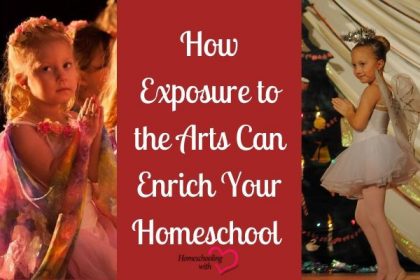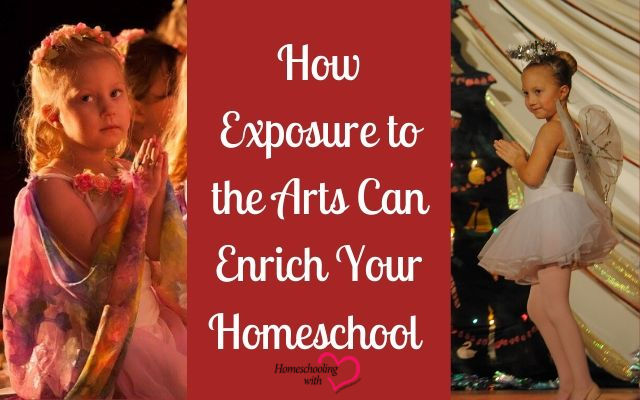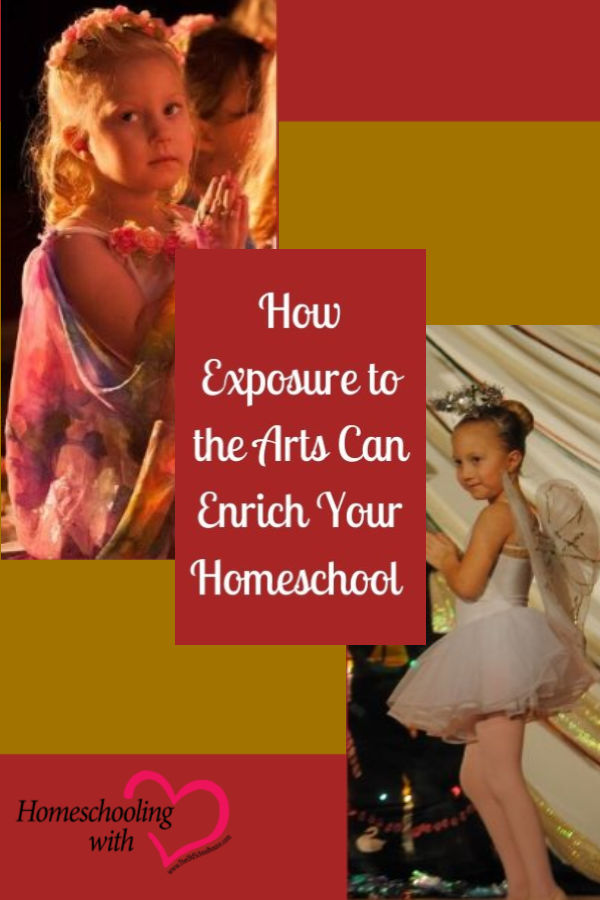How Exposure to the Arts Can Enrich Your Homeschool


This month, my daughter will be dancing in our town’s annual Christmas Festival presentation of The Nutcracker Suite. This is her fifth time participating in this ballet. Last spring, she also acted in a play based on the novels Anne of Green Gables and Anne of Avonlea. Both of those experiences opened the door to exploring some new literature. Last year, we read The Nutcracker and the Mouse King by E.T.A. Hoffmann and discussed the similarities and differences between the original story and the ballet. We read Anne of Green Gables by Lucy Maud Montgomery as well so she would fully understand the setting and timeline of the play she was in. This year, we are going to study the composer of the music for The Nutcracker Suite, Pyotr Ilyich Tchaikovsky.
When I was in school, I was blessed to have excellent theatre, art, and music programs at my disposal, which I was given school credit for, but more importantly left me with cherished, life-long memories and friendships. In the years after my graduation, though, I began to see those programs getting cut. Across the country, art education opportunities in schools have been in steady decline for decades. The increased emphasis on testing means that arts and non-tested subjects are less likely to get time and resources allocated to them. In the Houston area district, a full one-third of elementary and middle schools report that they lack even one full-time art teacher.
However, a recent study by Dan Bowen of Texas A&M and Brian Kisida of the University of Missouri found that “Arts learning experiences benefit students in terms of social, emotional, and academic outcomes.”1 Previous studies have shown that drama education improves verbal skills2 and music education strengthens IQ3 as well as math4 and reading skills.5
As homeschoolers, we aren’t at the mercy of public-school policies and budgets, nor do we have to squeeze time for arts around their school and homework schedule. We have the unique ability to provide our children with exposure to (and the opportunity to participate in) as many art-based learning experiences as we desire and feel is best for their development. If God has given your child a specific gift in a fine or performing art, it is an advantage to be able to develop that gift to the best of their ability and use it for His glory. In addition, it will bring them joy to use the gift they have been given.
Even if your child doesn’t have a calling in the arts, though, having knowledge and an appreciation for them will help your student to be more well-rounded. Fine art appreciation and composer study complement history studies. Drama provides wonderful opportunities for meaningful memory work as well as experience in public speaking. Dance intersects with physical education and helps develop musicality while ballet exposes children to the works of famous composers. My son doesn’t have any inclination to perform on stage, but he still enjoyed participating in acting and music classes with his sister.
Although you can invest some money in professional lessons for your children, it isn’t necessary. I choose to do so because it provides a social outlet, but there is a lot you can do on your own as well. There are online music and dance lessons that are available. Fine arts can be explored through visits to museums and picture study. Plays can be performed at home for family or friends. Also, just taking your children to the theatre or a ballet when the opportunity arises gives them a window into another world. Another idea to consider is organizing your own shows with fellow homeschoolers. Recently, I saw a homeschool group on Facebook that was seeking a boy to play the part of the Nutcracker in a performance that they were putting on.
Take advantage of the flexibility you have as a homeschooler, consider how you can tie the arts into other subjects that you are studying, and be creative! The possibilities are limited only by your imagination.
1 Investigating Causal Effects of Arts Education Experiences: Experimental Evidence from Houston’s Arts Access Initiative, by Daniel H. Bowen, Ph.D. (Texas A&M) and Brian Kisida, Ph.D. (University of Missouri) (Published Feb. 2019)
2 (Podlozny, A. (2000). Strengthening verbal skills through the use of classroom drama: A clear link. Journal of Aesthetic Education, 34(3-4), 91-104 2000)
3 Schellenberg, E. G. (2004). Music lessons enhance IQ. Psychological Science, 15(8), 511-514.
4 Lee, I. W. and Kim, S. J. (2006). The effects of integrated activity with music and mathematics on musical ability and the mathematical concepts of preschoolers. The Journal of Korea Open Association for Early Childhood Education, 11(2), 305-329.
5 (Gromko, J. E. (2005), The effect of music instruction on phonemic awareness in beginning readers. Journal of Research in Music Education, 53(3), 199-209
Heather Eberlin is a married mother of four children, ranging in age from seven to twenty-six. She is currently homeschooling her two youngest children and has felt called to share her journey in order to encourage others. She is an amateur gardener who is amazed at the things that God’s creation reveals when you take the time to pay attention to it. You can follow her at Musings from My Garden or download her free Homeschool Organizational Forms here.













































